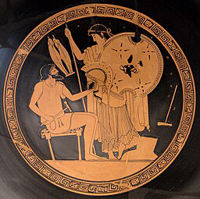
Hephaestus (Ἥφαιστοςs), the Olympian god of fire, metalworking, craftsmanship, artisans, sculptors, and metallurgy, stands as a testament to the power of skill and ingenuity. Unlike the other Olympian gods who often embodied beauty and physical prowess, Hephaestus was celebrated for his mastery of the forge, creating magnificent works of art and powerful tools.
A God of Skill and Resilience
Hephaestus, the son of Hera (in some accounts, Hera and Zeus), was often depicted as lame, a physical imperfection that led to his rejection by his mother. However, this did not diminish his divine power. Instead, he channeled his energy into his craft, becoming the unparalleled artisan of the gods.
Key Attributes and Symbols
- Master Craftsman: Hephaestus was the divine blacksmith, creating intricate and powerful objects for the gods, including Zeus's lightning bolts, Achilles's armor, and Aphrodite's girdle.
- God of Fire and the Forge: He controlled the fires of the forge, using them to shape and mold metal.
- Patron of Artisans: He was the protector of all skilled craftsmen, inspiring them to create works of beauty and utility.
- Symbols: His symbols include the hammer, anvil, tongs, fire, and the forge.
Myths and Legends
Hephaestus features in several compelling myths, highlighting his skill and ingenuity:
- Hephaestus's Revenge: Rejected by Hera, Hephaestus crafted a magnificent golden throne and sent it as a gift. However, the throne contained invisible restraints, trapping Hera. Hephaestus demanded Aphrodite's hand in marriage as the price for her release.
- The Creation of Pandora: Hephaestus was tasked by Zeus with creating Pandora, the first woman, from clay. He imbued her with beauty and skill, but also with a vessel containing all the evils of the world.
- The Construction of the Gods' Dwellings: Hephaestus was responsible for building the magnificent palaces and dwellings of the Olympian gods, showcasing his architectural and engineering prowess.
- The Trap of Ares and Aphrodite: When Hephaestus discovered his wife, Aphrodite, in an affair with Ares, he crafted invisible nets to ensnare them, publicly humiliating them before the other gods.
Hephaestus' Enduring Legacy
Hephaestus represents the importance of skill, perseverance, and the transformative power of creativity. His story reminds us that physical imperfections do not define one's worth and that true strength lies in one's abilities and dedication.
Modern Relevance
Hephaestus's image remains relevant in modern society, where craftsmanship and innovation are highly valued. He represents the dedication and skill required to create works of lasting beauty and utility. He is also a symbol of resilience, showing that even in the face of adversity, one can achieve greatness through hard work and determination. He is the patron god of modern engineers, and all those who work with their hands to create.
 Menu
Menu